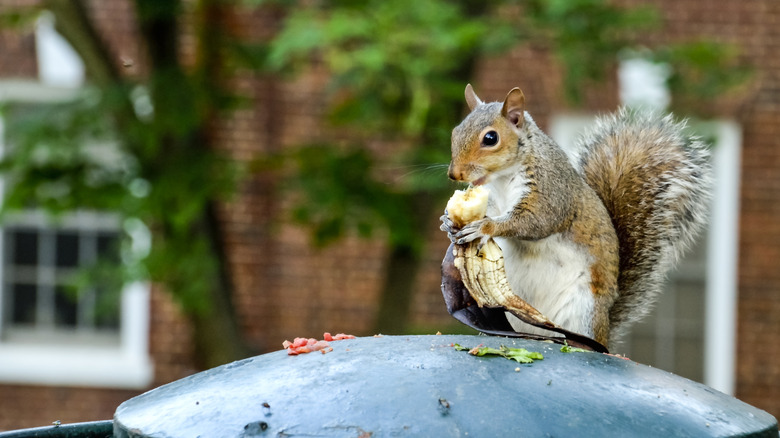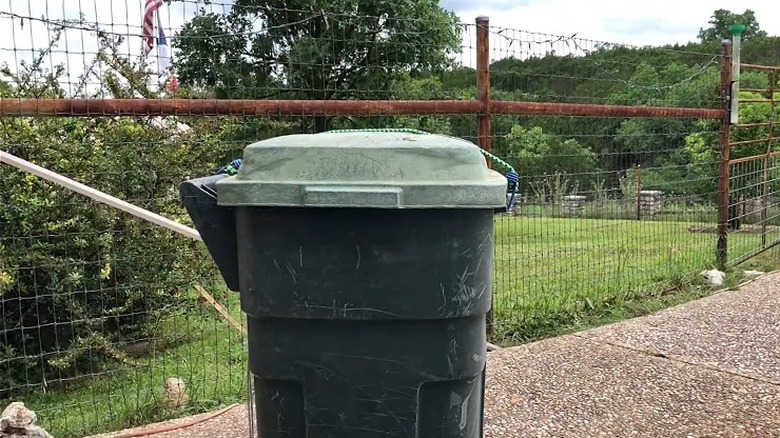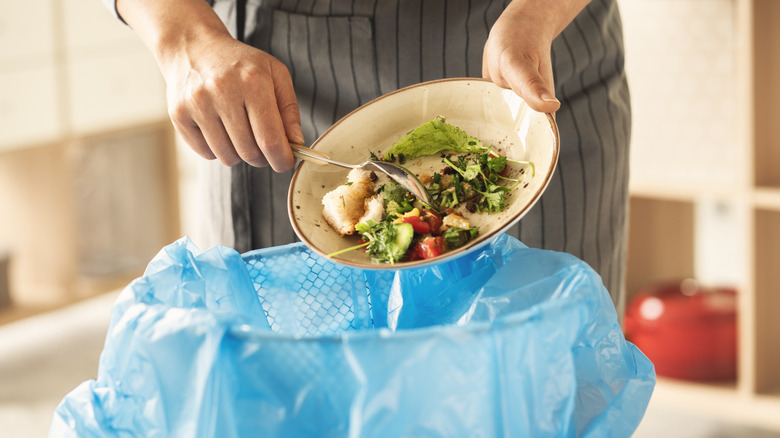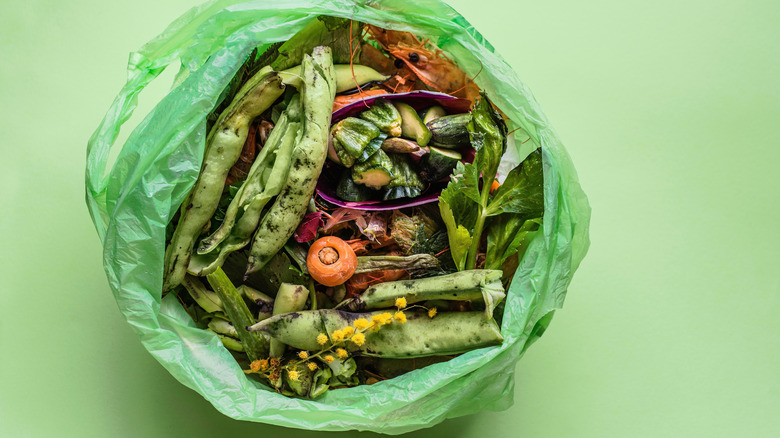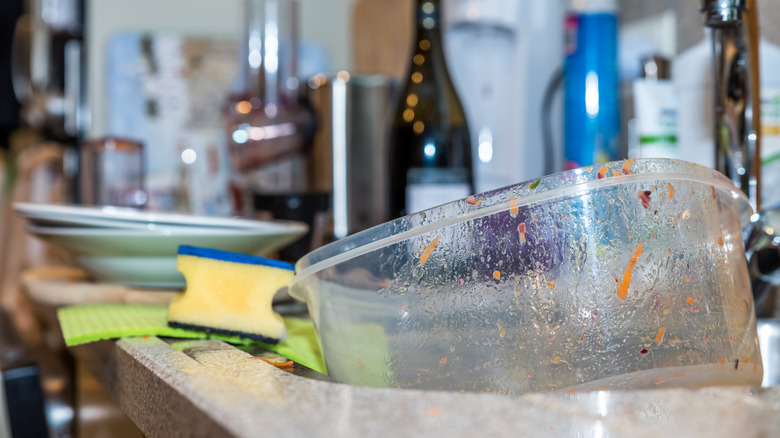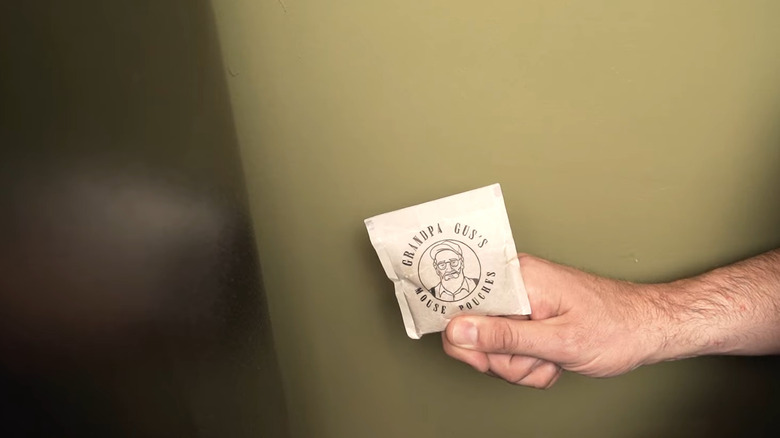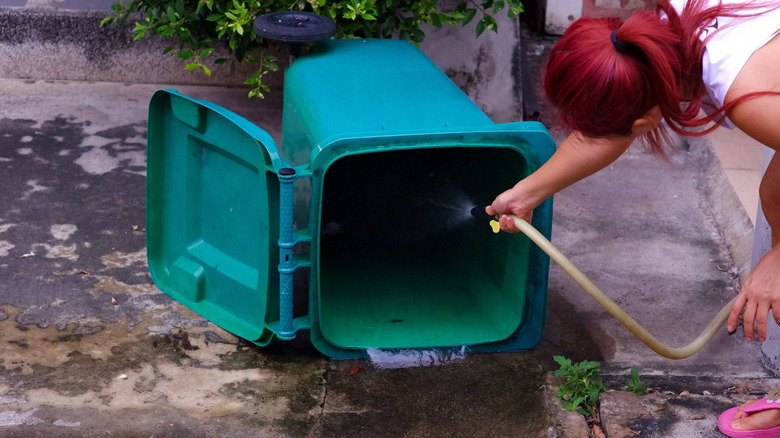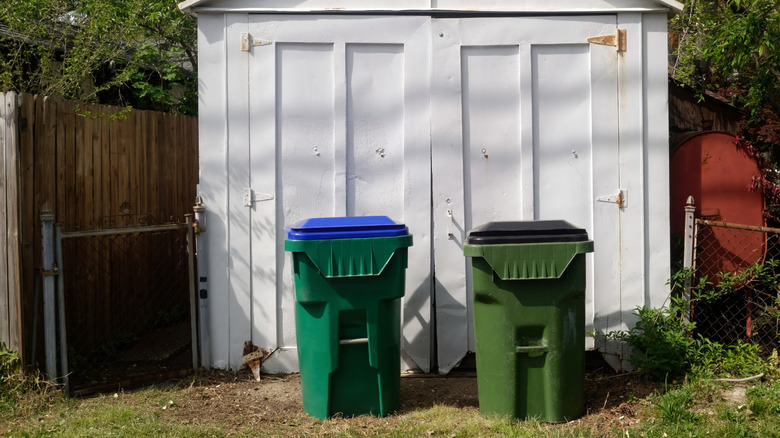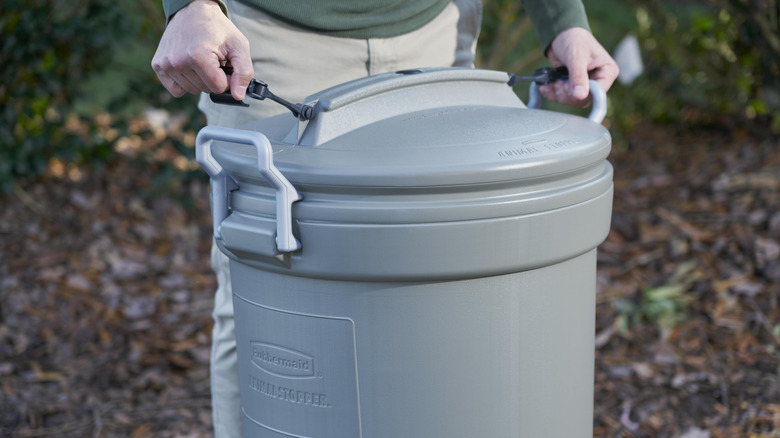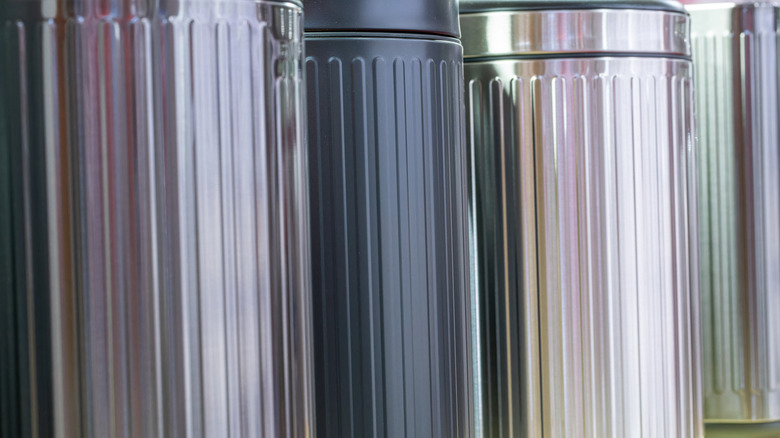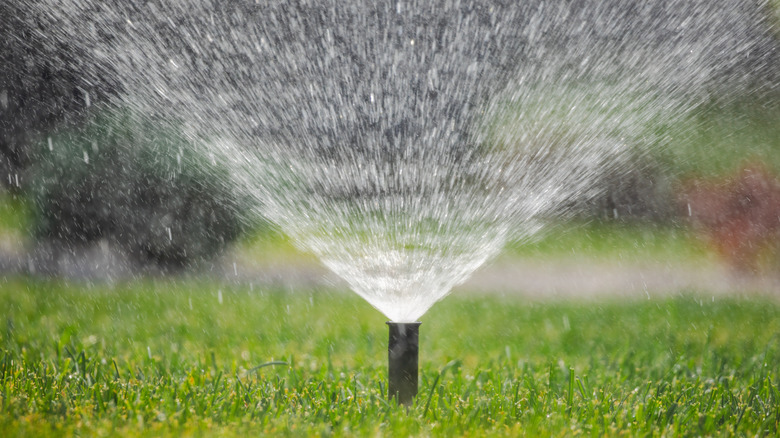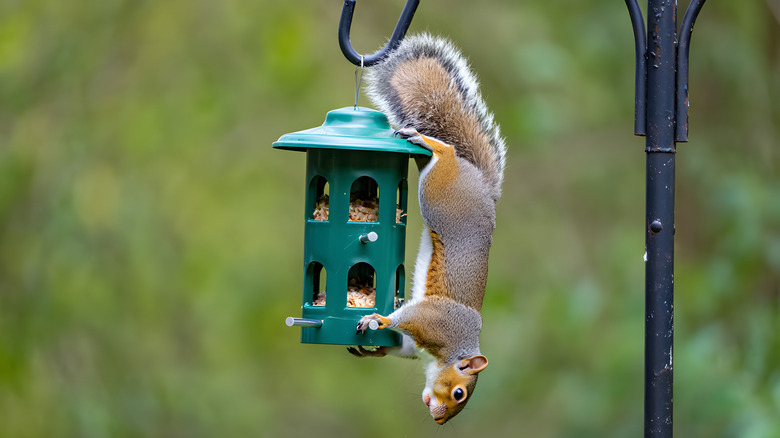12 Clever Ways To Keep Squirrels From Getting Into Your Garbage Cans
We may receive a commission on purchases made from links.
Throwing your garbage away seems like a relatively straightforward process, until you have to deal with wildlife issues. What you might consider garbage can be a potential food source for a variety of animals, including squirrels. Squirrels are an important part of the ecosystem, but they can also create an array of problems around your yard and garden. They're often attracted to garbage cans, particularly during the winter months when food may be scarce. You also certainly don't want them around your garbage — they can create a mess, and are more likely to stick around (and cause further trouble) if they have a reliable food source.
While there isn't a fail-safe standalone method to keep them away entirely, implementing a variety of strategies can prevent squirrels from getting into your garbage cans and make your trash less of a draw. It's best to do so before they become a problem, but you still have options if you've spotted squirrels around the vicinity. No matter which techniques you try, know that any new method ought to be part of a comprehensive squirrel management plan. The best methods to try involve ways to minimize squirrel access to garbage cans directly, trying out deterrents, and limiting the food sources that are drawing them there to begin with.
Keep the cans tightly sealed with bungee cords
Going lidless with your garbage cans is absolutely off-limits. Not only do lidless cans emit bad odors around your yard, but you are basically inviting squirrels and other wildlife to dig through the garbage. You might already have a standard garbage can with a lid to help avoid such problems. Still, even a garbage can with a lid can be vulnerable to squirrels, especially modern versions that have flip-up lids for easy access. The problem is that this can allow for wildlife like squirrels to easily access your trash, too. An easy solution is to use a bungee cord or locking system to help prevent squirrels from lifting up the lids.
If you've ever tied anything down with bungee cords, you know that they can help keep items lashed in place. The same theory can be applied to keeping trash can lids secure from squirrels and other wildlife. Just remove the cords when taking out the trash, as well as on garbage collection day. Another option is to buy a locking system that's specifically designed for keeping animals out of the garbage, such as the Trash Lock Original Two Strap Lid Lock.
Place all food scraps in bags
While it's a good idea to try to exclude squirrels from garbage cans to limit their access to waste, it's also smart to reconsider how you're throwing out the garbage in the first place. Since squirrels are attracted to the food waste in the cans, you'll want to do what you can to help mask these items. To that end, resist the urge to toss out food waste in the cans directly, as this will inevitably attract rodents like squirrels. This is similar to the potential effects of composting on attracting wildlife. Aside from food scraps, squirrels might also be attracted to any food wrappers, too.
One way to help reduce squirrel problems around your garbage cans is to place all food scraps in bags beforehand. Not only does this make taking out the garbage much easier, but the bags work to contain food waste — especially if they're heavy-duty. This will help to reduce food-related odors that may attract squirrels. Also, throwing away unbagged food scraps can lead to caked-on messes in the garbage cans over time, which may continue to lure squirrels long after garbage collection day. You can also consider double-bagging food waste, so make extra sure tempting odors don't issue forth from your trash can.
Consider compostable bags for food waste
Keeping all food waste in sealed up in bags may help to conceal odors and hide food items that might attract squirrels to your garbage cans, but there's also a downside to consider. Unfortunately, conventional trash bags are made of plastic, which means you'll be spending money on something already not eco-friendly that's just getting thrown away. While these bags can have a number of benefits in terms of cleanliness, hygiene, and affordability, it's understandable if you have reservations about using more plastic-based items. If you happen to be looking for ways to ditch plastic kitchen items for safer alternatives, the last thing you probably want is to use even more plastic. Compostable bags may offer an alternative.
If your budget has a bit more room, consider switching from plastic to compostable bags for food scraps as an alternative to traditional plastic trash bags. If you want to give compostable garbage bags a try, consider these SuperBio 13 Gallon Kitchen Waste Bags as a starting point. Or, if you want to go the full composting route, check out bokashi composting, which is a specific kind of composting that involves adding an inoculant to the food scraps in a special bucket to stimulate quick fermentation.
Rinse out any takeout or other food containers
While many people enjoy cooking at home, there are just some situations when you need the convenience of ordering takeout food. In fact, according to a 2024 survey from US Foods, the average American orders takeout about three times per month. While easy and convenient, takeout orders inevitably lead to more trash you have to deal with in the form of wrappers and containers. Before throwing them in the outdoor garbage can, consider that squirrels might be attracted to these unrinsed receptacles.
Therefore, thoroughly rinse out the containers before tossing them. The same goes for any other types of food containers you throw away. Be sure to wash out all crumbs and any caked-on food items for fewer squirrel incentives. This is also an important step to take if any of the containers are recyclable, as food scraps can potentially contaminate the items and make them ineligible to recycle. For even less waste, avoid throwing out plastic takeout containers and use them for other purposes.
Try deterring squirrels with peppermint oil
While there are lots of hacks out there around plants that allegedly deter squirrels, placing a few herbs around the vicinity of your trash cans probably won't send the little critters running for the woods. Peppermint essential oil, however, is one natural substance you can try. The strong scent of the oil may act to temporarily deter squirrels from around your garbage cans, and it's relatively easy to apply.
You can either dilute the oil to create a spray, or use it on a cotton swab and dab the outsides of the can. To go the spray route, fill up an empty spray bottle with water, then add a dozen or more drops of the oil before shaking to mix. Now, spray the product in and around your garbage cans. Reapply often, particularly after it rains. You may even be able to use peppermint oil in your basement and other areas of your home to help with overall rodent management. Wear gloves whenever you handle peppermint essential oil to prevent skin rashes and other topical side effects. Peppermint isn't a foolproof solution, but if done correctly, it may keep squirrels at bay.
Or, try a peppermint-based store-bought repellent
If you don't feel like mixing up a DIY peppermint oil spray, you can also try out a store-bought peppermint-based repellent product. Besides saving you the trouble of making a solution in a spray bottle, some purpose-built peppermint repellents for squirrels and rodents may also last longer and need to be reapplied less frequently. A lot of spray products do need to be reapplied continually, but if you opt for repellent in a sachet it could last for multiple weeks.
For instance, this NCOPDFF Squirrel Repellent only needs to be renewed roughly every three months, according to the instructions. It's sold in sachets of granules which you can strategically place around your backyard, concentrating on the area around your trash cans. Reviews report a lot of success from the sachets, with one noting, "We've had squirrels digging through our trash cans, making a mess all over the yard. After applying this squirrel repellent around the bins, they haven't been back."
Wash out the cans on a regular basis
Garbage cans are likely one of the dirtiest items you have around your home, and for good reason. These receptacles take on a lot, between trash, food scraps, and other waste items on a regular basis. While you're likely more focused on cleaning other areas of your home, it's important to not neglect your garbage cans. Regularly washing the cans may help reduce bacteria and dirt, as well as odors that could attract squirrels and other rodents.
The good news is that this method is relatively easy and inexpensive. Grab some dish soap, warm water, a bucket, and a long-handled brush. Fill up a bucket with soapy water and then work the brush through the interior of the cans first. Don't neglect cleaning the exterior of the garbage cans during the process, so be sure to scrub these surfaces, too. Rinse the entire can with a garden hose and allow it to air-dry. The process will help to keep your garbage cans both clean and odor-free, with (hopefully) fewer pest problems. As for frequency, this depends on how filthy the cans get, as well as the time of year. For example, garbage cans might require weekly cleanings during the summer when the heat worsens odors, but you could be able to reduce the frequency to a monthly or bi-monthly basis during other seasons.
Place the cans in an enclosed area
If your squirrel problem is severe, it may be time to implement more exclusionary practices as part of your wildlife management plan. This is where keeping all garbage cans in an enclosed area will help. By adding an extra barrier between squirrels and the garbage, you ideally prevent access by these animals and others. In theory, more barriers may also mean fewer odors that can otherwise lure squirrels to the area.
There are few possible options to consider for garbage can placement. First is placing the cans in a standalone shed in your yard to deter direct access to your trash. Another option is to build a vinyl fence-like enclosure around the cans to make it harder (although not impossible) for squirrels to climb over. An unattached garage is another option if you have the space. Just think carefully before storing them in an attached garage, though. Not only might the cans stink up your garage, but they can also become potential fire hazards, too, especially if containing ash or highly flammable items.
Invest in trash cans with screw-on or locking lids
Aside from keeping your trash cans in an enclosed area, consider other types of exclusionary methods to keep squirrels from rummaging through the garbage. This may involve switching up the styles of trash cans with a focus on their lids. If you're having problems securing those typical flip-up lids from pesky squirrels, try one with a screw-on, or locking, lid instead. These are designed to help keep the cans even more squirrel-proof, while having the added bonus of preventing escaped odors that could lure these rodents to the area.
As their name suggests, screw-on lids work by twisting them. They cannot be easily twisted open by a young human, let alone a wild animal like a squirrel. Some pest control companies even recommend these styles of cans for homes that have a lot of wildlife present in the area to prevent problems from the get-go. Unfortunately, if you live in an area where you must use trash cans of a specific style or those provided by your garbage collection company, choosing different lids may not be a viable option. One such example is garbage cans with bars on the fronts, which work with automated trash trucks.
Consider switching to stronger garbage cans or metal versions
While having a sealed trash can is helpful in keeping unwanted wildlife out of the garbage, your squirrel management plan may need to go beyond selecting the right lids. Squirrels are particularly persistent creatures, and they've even been known to chew through plastic from time to time. They're able to do so thanks to their sharp front teeth, coupled with their strong jaws that allow them to chew through a variety of materials. If a squirrel is determined to gain access to your trash, these plastic-chewing capabilities may even include your typical plastic outdoor garbage can. Another problem with plastic is that it's notorious for absorbing odors. This quality can make your plastic trash cans smell like food long after garbage collection day.
To further deter squirrels, consider switching to a can with tougher plastic, or perhaps a metal version made of aluminium or steel for extra protection. This will not only help to keep squirrels out, but it can also deter other plastic-chewing rodents, such as mice and rats. Also, any garbage can with holes should be replaced immediately to prevent all types of pests that could subsequently access trash through these open spaces. If you're not certain whether it's time to replace your garbage cans, seeing unexplained teeth marks along their plastic exteriors is a good sign to make the switch ASAP.
Try motion-activated sprinklers in the vicinity of your trash cans
As fearless as squirrels might seem as they bravely approach your garbage cans for food, it turns out that certain things may scare them. One possibility is motion-activated sprinklers. The idea is to try to place the sprinklers near the vicinity of your garbage cans so that they will turn on and possibly startle any wildlife that might try to sneak into the area. One example is the X-Pest Motion Activated Animal Repeller with Water Sprinkler, which is designed to turn on and spray water when it detects motion. With this method, you might be able to keep squirrels out of your garden while benefiting your lawn, too.
The biggest caveat to this method is that unless you turn off the devices before taking out the trash, chances are you or another household member may activate the sprinklers. It's easy to see how this can get frustrating if you and your pets activate the sprinklers more often than any squirrels and other wildlife. If you do have some success with motion-activated sprinklers and manage to stay dry throughout the process, there's also a possibility that the squirrels will get used to them. They may even eventually learn to live with getting sprayed with water here and there. To that end, you might need to rotate the sprinklers to different spots in your yard to keep them guessing.
Keep other food sources away from your garbage cans
Food sources are the main reasons squirrels are drawn to your outdoor garbage cans, which is why you want to do what you can to keep them from feasting on the trash. Even if you've tried out multiple squirrel exclusionary and deterring techniques, it's not impossible to still see these rodents in the vicinity. There's a logical explanation for their presence, and it all involves, once again, food. As with many animals, if squirrels find one source of food, they might try to access nearby spaces like garbage cans for others. So, even with trying multiple hacks to keep squirrels away from your garbage cans, these can become futile if you have other sources of food nearby.
Therefore, keep garbage cans away from any other potential sources of squirrel food. These can include bird feeders, fruit trees, and vegetable gardens. Squirrels can become a problem around these spaces, whether or not these zones are near your outdoor trash cans. You don't necessarily have to give up on growing fruits and veggies or stop feeding backyard birds, though. Similar to garbage cans, minimize access to these food sources to reduce the number of squirrels in your yard more generally. Consider the best ways to keep squirrels out of your bird feeder, and pick up fallen seed on a daily basis. It's also helpful to pick fruits and vegetables as soon as they ripen. The fewer food sources there are, the less likely these intelligent rodents will hang around.
